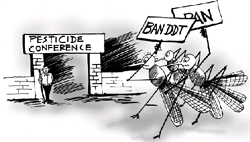Pact on pollutants
 representatives from 115 nations signed a draft agreement to ban eight highly toxic pesticides and other chemicals, that are among the "dirty dozen' persistent organic pollutants ( pop s), which are compounds that accumulate in the food chain. However, there was no consensus on ddt ( dichloro diphenyl trichloroethane) , which is used for eradicating mosquitoes, that transmit malaria.
representatives from 115 nations signed a draft agreement to ban eight highly toxic pesticides and other chemicals, that are among the "dirty dozen' persistent organic pollutants ( pop s), which are compounds that accumulate in the food chain. However, there was no consensus on ddt ( dichloro diphenyl trichloroethane) , which is used for eradicating mosquitoes, that transmit malaria.
"The pact is a breakthrough in eliminating some of the worst pollutants of the 20th century,' said Klaus Topfer, executive director of the United Nations Environment Programme ( unep) . These proposals will now go to various governments for consultations before a fresh round of talks in March in 2000 in Bonn. T he treaty is expected to be signed in Stockholm in 2001.
The negotiators have agreed to eliminate pesticides like aldrin, endrin and toxaphene. Five other pesticides
Related Content
- A global pact for the environment: legal foundations
- Govt approves signing of pact between India, SACEP
- Compliance is the watchword
- Japan, U.S. sign new environment pact for U.S. military bases that allows municipal access for checks
- Beijing funds pollution control in neighboring cities
- Review 1994 water pact to revive Yamuna: Experts
